Everything at your fingertips
galicia | Nov 2022
The first time I thought about it was in Vilatuxe, a small town near Lalín, the place where once the mayor said that he would make a cow census as an electoral promise. (In Galicia that census was carried out by Manuel Rivas clarifying that they were basically one million). There in Vilatuxe, some locals decided to make the pig slaughter in 2007 but making a difference. It was not made in the traditional way because the Government had banned it. The Government, like so many others, sometimes has to overturn traditions, especially if they are harmful. It was decreed that the pig slaughter must be made without pain or suffer. Thus, the fusion of tradition (the pig dies) and modernity (the pig dies in peace) was imposed; instead of killing the pig with a knife, as it had always been done, it was killed with a stun gun, as in the Old West ("all parts of a pig are used, even screams, as gun manufacturers are going to demonstrate," Arcadi Espada wrote then). My grandfather, a notorious killer in his village, would thus become Billy the Kid.

Vilatuxe’s people had a brilliant idea, something that I am still thinking about completely amazed. There, the locals decided that the pig was going to die as usual but as never before, both ways at the same time. And so it was done. That show (magical realism in its hard core, Galicia, always reaches its highest point) was attended by 1,200 people and there was even a comedy performance under the attentive and calm gaze of the mayor and a kind of central committee that had been rehearsed for almost two months. The pig arrived corpsed at its slaughter. He was taken there dead. What was done next was the usual procedure, that’s to say, it was slit from top to bottom, cut into pieces, its guts were washed, and the spicy sausages were made. All would be perfect if it weren't for the fact that, as soon as the knife was driven into the pig, it started screaming. It shouted and screamed in such a way that its shrieks shook the public, who believed they were attending a traditional slaughter, the slaughter of the pig.
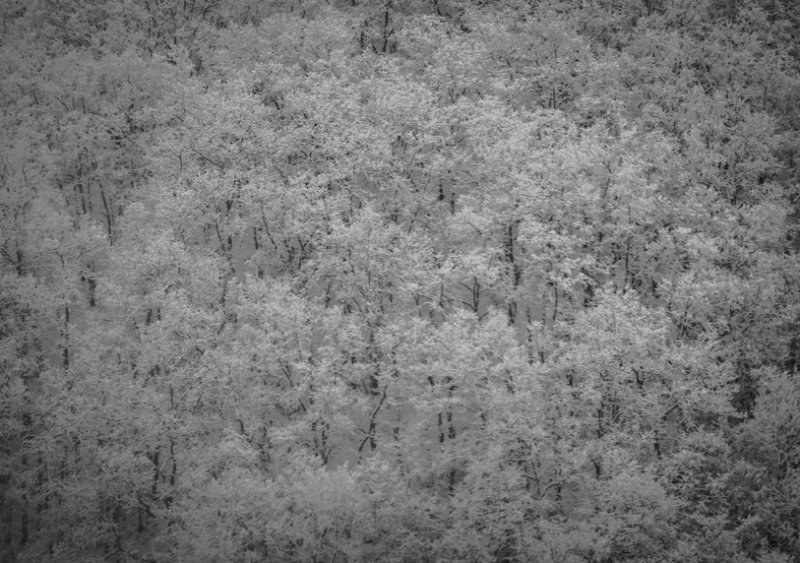
There was a catch. In a nearby grain storage there was a music player that was blaring the pig's squeals. It was a playback. The ‘Milli Vanilli’ of pigs mixed with zombies from Thriller: a real show. At that time, I called it 'the CD slaughter’, and received the sympathetic trick with grace and admiration. With age comes maturity, and in the best cases, a new perspective. Mine was something I had never noticed after decades of studying the case of Vilatuxe’s pig: the squeals were recorded, that’s right, but which pig was recorded? If they were recorded from any pig in their knife slaughter to make the modern and legal slaughter, the pistol slaughter, didn't they already know that it was forbidden? What pigs are we talking about: wouldn't it be the same? Did they kill him first as God commanded, and then as God commands to tell society that things can be done differently, but first we had to do them the same?
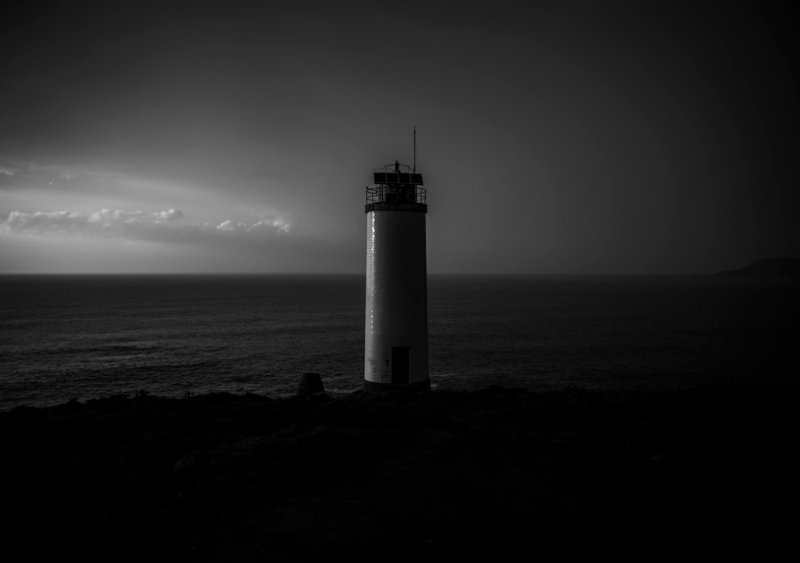
For the last ten years, the same ones I have been living (rather having the center of operations) in Madrid, a question has besieged me: why so much about Galicia in my articles, why always Galicia in my novels, why the accent of Galicia so persistently in my voice every day on the radio, a decade later? I never explain -because I have never had time and because there are questions that can be answered by themselves- the story of that Vilatuxe’s massacre. Knowing that a story is never ended, that there are no open endings because everyone is open, that the popular doubtfulness with which we Galicians are labelled, is the vulgar way of naming something much more fun and interesting: mystery. That's why two years ago, when I went to the Costa da Morte to spend a few days there and place the action of my next novel on those cliffs, I knew that an Englishwoman, Annete Meakin, had gone and baptized it. It's a too simple and prosaic name for such an overwhelming view: it works, as a simple stun gun would work, but there's always something inside a grain storage. A great book to know the real essence of A Costa da Morte is the one published by Rafael Lerma: 'Costa da Morte, dreams and shipwrecks'. It speaks about one of the most descriptive mythical stories of the Costa da Morte (stories about myth, between truth and belief, stories spread by word of mouth until they have lost their origin, if the origin really existed): reality and fiction, gesture and deception. Bullfighting before bullfighting.
Lerma says that on stormy nights,
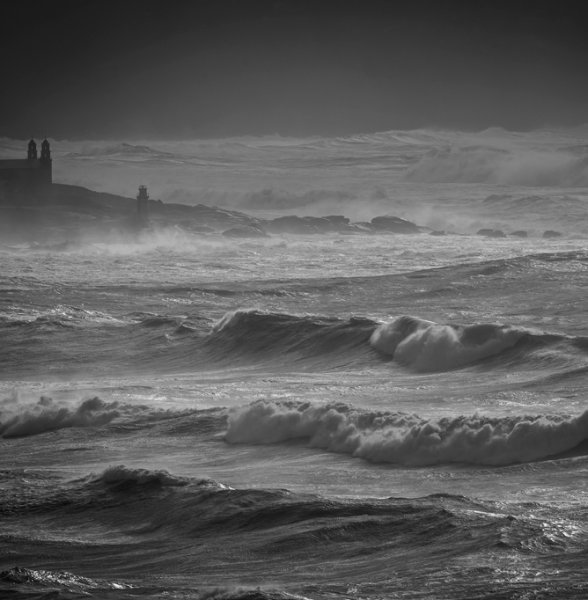
By the way, in one of the looting (not necessarily caused by that ruse), the book tells about the shipwreck of the Nil in 1927. Among the many belongings left by the ship floating in the sea, it seemed that huge boxes of milk were also lost that the inhabitants of the nearby villages quickly confused with paint, taking advantage of it to clean up their houses before the flies stuck to the walls like their lives depended on it desperately. A story as interesting as the shipwreck of the English ship Chamois that Lerma tells gracefully: the locals confused "Chamois" with "bois" (oxen), and turned up with sickles and knives while the English looked at them horrified as if that corner of Galicia, as if the entire Galicia, was still to be civilized and its inhabitants received foreigners as pieces of meat to gobble.
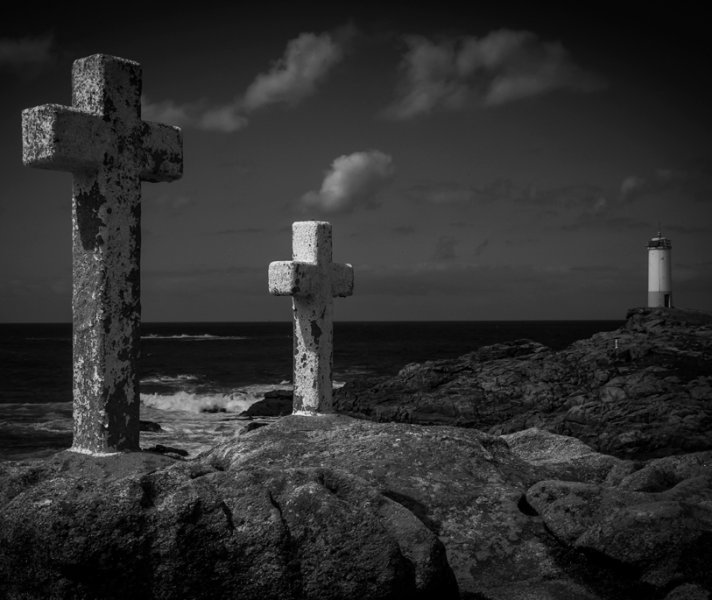
I have always believed that the true poetry of territories, that which makes them genuine, is when one does not know if the geographical accidents we see are real or are happening to us. That is why I put all the characters in that novel in a land of shipwrecks to, by believing that they contemplated them, suffer a more intimate and delicate one, the one suffered when you do not know what is happening. There is not even a grain storage nearby to know where the screams are coming from. If there is no landscape more beautiful and wild than the landscape of the end of the earth, the place where the Romans believed that the Sun was swallowed by the sea because everything ended there, it is because we are also the end of something, the last and brightest light of all, the one that corresponds to the horizon.
And yet, just as the stun gun did its half-hearted job, so metaphors are half-breathed when reality sets in. Many years ago, in an old article published by the journalist Hibai Arbide in the magazine Enfocant, it was said that for five years corpses from shipwrecks in the Mediterranean had been lifted into the nets of tuna vessels. To avoid problems, they were returned to the sea without informing about them.
At the time I wrote that it was great news because it was not the usual forgetfulness, but a double one. The dead insisted that the truth must be known: the living returned them from the bottom. But the problem remains the same: humanitarian.
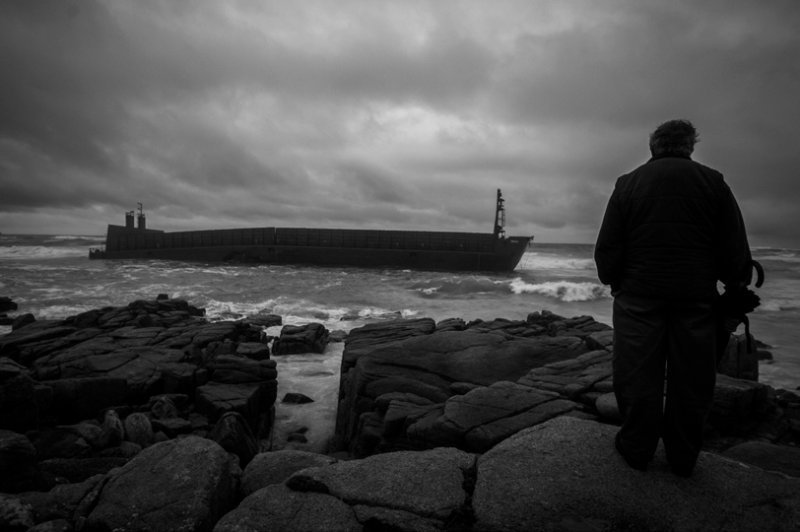
Further, in Galicia, the Atlantic is like having a war at your gate surrounding everything: people live off it and people often die in it if they are fortunate. Sometimes people don’t come back. More and more people return there after death: the ashes are thrown away and the ocean is allowed to do with them what it considers (in A Lanzada those of the ex-footballer Héctor Rial were scattered; a local newspaper had announced that it would be in Pasarón, Pontevedra’s football pitch, and the next day it was announced that they had better scatter on the beach "contrary to what certain unfounded news had said"). It is a feat to explain the history of this land without keeping the sea in mind, including the appearance of oil tankers like a modern Santa Compaña returning home drunkenly. Anyone who thinks that the fire is hypnotizing has never seen the Costa da Morte: it strikes with the hulls of the thousands of ships that have been buried alive, the bones of the corpses that crawl inside with a terrible feeling of fullness. It looks like someone about to deliver. There is so much strength that you actually know that it is not the cliff against which everything hits but the continent: Europe itself with the will of that nobleman offended by being quoted in In Search of Lost Time who went in solitude to his castle to respond to Marcel Proust.
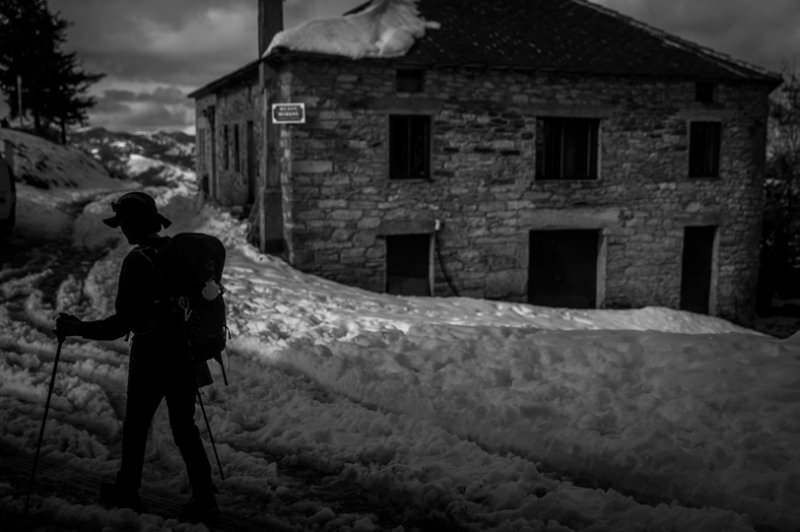
And then there's the cold. I sometimes go with her to Fisterra in winter to show her what Madrid or anywhere will never have. To stand it better I tell her that the cold is elegant. The overalls, the scarves tied around the neck like a rope or fallen to the waist, like the hair of La Pantoja. The booties too. Even cut lips have their charm. So do the eyes a little reddened. The chill is so tender, in solitude, while you are waiting to withdraw money from the ATM. Almost everything is beauty in the cold, I tell her. The snowy landscapes of inland Galicia. Recemunde, in Pobra de Brollón, under a large endless white blanket, as if that was Heaven. New York cannot be understood without snow, just as you cannot understand killing without wearing black leather gloves, tight to your fingers, whether to wield a gun or break a neck. It is cinema that educates us, Love. Literature. Think of a sub- zero temperature, whatever you want, and a living room with a fireplace while the wolves rub their snouts against the window of the village house, as if warning. Bateman leaving any pub waving a hundred- dollar bill in front of a beggar and putting it back in his pocket, almost impassive. The wool stockings of the little cousin, and grandma spending the afternoon in front of a stove as if lying in the solarium. The wool hats. And those gloves so elegant, those gloves to which they strip their fingers to pick up the mobile and answer any email, the first one coming to mind.
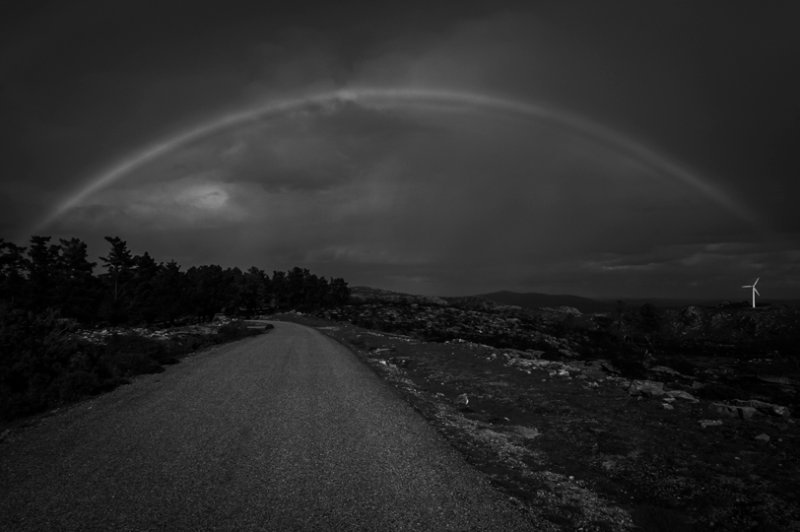
All of that is at your fingertips. A ridiculous legend says that God created Galicia by putting His hand on it, hence the tidal inlets. But we actually squeeze it. That's why he sometimes snorts.
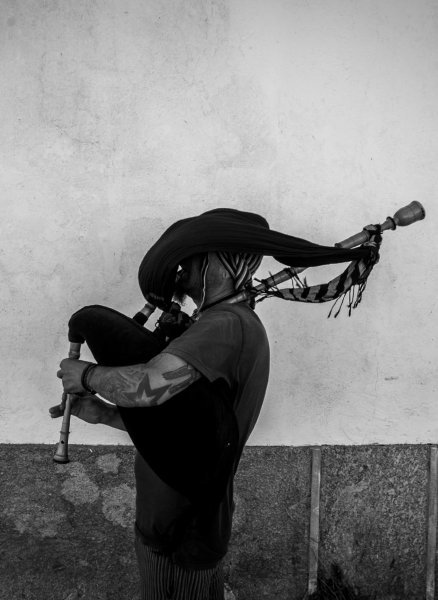

Vilatuxe’s people had a brilliant idea, something that I am still thinking about completely amazed. There, the locals decided that the pig was going to die as usual but as never before, both ways at the same time. And so it was done. That show (magical realism in its hard core, Galicia, always reaches its highest point) was attended by 1,200 people and there was even a comedy performance under the attentive and calm gaze of the mayor and a kind of central committee that had been rehearsed for almost two months. The pig arrived corpsed at its slaughter. He was taken there dead. What was done next was the usual procedure, that’s to say, it was slit from top to bottom, cut into pieces, its guts were washed, and the spicy sausages were made. All would be perfect if it weren't for the fact that, as soon as the knife was driven into the pig, it started screaming. It shouted and screamed in such a way that its shrieks shook the public, who believed they were attending a traditional slaughter, the slaughter of the pig.

There was a catch. In a nearby grain storage there was a music player that was blaring the pig's squeals. It was a playback. The ‘Milli Vanilli’ of pigs mixed with zombies from Thriller: a real show. At that time, I called it 'the CD slaughter’, and received the sympathetic trick with grace and admiration. With age comes maturity, and in the best cases, a new perspective. Mine was something I had never noticed after decades of studying the case of Vilatuxe’s pig: the squeals were recorded, that’s right, but which pig was recorded? If they were recorded from any pig in their knife slaughter to make the modern and legal slaughter, the pistol slaughter, didn't they already know that it was forbidden? What pigs are we talking about: wouldn't it be the same? Did they kill him first as God commanded, and then as God commands to tell society that things can be done differently, but first we had to do them the same?

For the last ten years, the same ones I have been living (rather having the center of operations) in Madrid, a question has besieged me: why so much about Galicia in my articles, why always Galicia in my novels, why the accent of Galicia so persistently in my voice every day on the radio, a decade later? I never explain -because I have never had time and because there are questions that can be answered by themselves- the story of that Vilatuxe’s massacre. Knowing that a story is never ended, that there are no open endings because everyone is open, that the popular doubtfulness with which we Galicians are labelled, is the vulgar way of naming something much more fun and interesting: mystery. That's why two years ago, when I went to the Costa da Morte to spend a few days there and place the action of my next novel on those cliffs, I knew that an Englishwoman, Annete Meakin, had gone and baptized it. It's a too simple and prosaic name for such an overwhelming view: it works, as a simple stun gun would work, but there's always something inside a grain storage. A great book to know the real essence of A Costa da Morte is the one published by Rafael Lerma: 'Costa da Morte, dreams and shipwrecks'. It speaks about one of the most descriptive mythical stories of the Costa da Morte (stories about myth, between truth and belief, stories spread by word of mouth until they have lost their origin, if the origin really existed): reality and fiction, gesture and deception. Bullfighting before bullfighting.
Lerma says that on stormy nights,
“with rain and fog that prevented visibility, some inhabitants of the villages came to walk their oxen next to the cliffs, hanging from their horns lanterns lit that simulated the lights of other boats. In this way, they created confusion among the ships, which approached the coast and, inevitably, ended up rushing against the pitfalls, being then looted by the locals.”.

By the way, in one of the looting (not necessarily caused by that ruse), the book tells about the shipwreck of the Nil in 1927. Among the many belongings left by the ship floating in the sea, it seemed that huge boxes of milk were also lost that the inhabitants of the nearby villages quickly confused with paint, taking advantage of it to clean up their houses before the flies stuck to the walls like their lives depended on it desperately. A story as interesting as the shipwreck of the English ship Chamois that Lerma tells gracefully: the locals confused "Chamois" with "bois" (oxen), and turned up with sickles and knives while the English looked at them horrified as if that corner of Galicia, as if the entire Galicia, was still to be civilized and its inhabitants received foreigners as pieces of meat to gobble.

I have always believed that the true poetry of territories, that which makes them genuine, is when one does not know if the geographical accidents we see are real or are happening to us. That is why I put all the characters in that novel in a land of shipwrecks to, by believing that they contemplated them, suffer a more intimate and delicate one, the one suffered when you do not know what is happening. There is not even a grain storage nearby to know where the screams are coming from. If there is no landscape more beautiful and wild than the landscape of the end of the earth, the place where the Romans believed that the Sun was swallowed by the sea because everything ended there, it is because we are also the end of something, the last and brightest light of all, the one that corresponds to the horizon.
And yet, just as the stun gun did its half-hearted job, so metaphors are half-breathed when reality sets in. Many years ago, in an old article published by the journalist Hibai Arbide in the magazine Enfocant, it was said that for five years corpses from shipwrecks in the Mediterranean had been lifted into the nets of tuna vessels. To avoid problems, they were returned to the sea without informing about them.
"Lupo is a sturdy little man who has spent more than thirty years fishing. But today he can no longer do it, his neighbours pointed him out as traitor for having brought this story to light. He is alone, the community to which he belonged does not forgive his 'denunciation'. In Portopalo and Lampedusa everyone knew what had happened, bones had emerged for months, as well as small objects, signs of lives dramatically interrupted a few kilometers from the promised land."
At the time I wrote that it was great news because it was not the usual forgetfulness, but a double one. The dead insisted that the truth must be known: the living returned them from the bottom. But the problem remains the same: humanitarian.

Further, in Galicia, the Atlantic is like having a war at your gate surrounding everything: people live off it and people often die in it if they are fortunate. Sometimes people don’t come back. More and more people return there after death: the ashes are thrown away and the ocean is allowed to do with them what it considers (in A Lanzada those of the ex-footballer Héctor Rial were scattered; a local newspaper had announced that it would be in Pasarón, Pontevedra’s football pitch, and the next day it was announced that they had better scatter on the beach "contrary to what certain unfounded news had said"). It is a feat to explain the history of this land without keeping the sea in mind, including the appearance of oil tankers like a modern Santa Compaña returning home drunkenly. Anyone who thinks that the fire is hypnotizing has never seen the Costa da Morte: it strikes with the hulls of the thousands of ships that have been buried alive, the bones of the corpses that crawl inside with a terrible feeling of fullness. It looks like someone about to deliver. There is so much strength that you actually know that it is not the cliff against which everything hits but the continent: Europe itself with the will of that nobleman offended by being quoted in In Search of Lost Time who went in solitude to his castle to respond to Marcel Proust.

And then there's the cold. I sometimes go with her to Fisterra in winter to show her what Madrid or anywhere will never have. To stand it better I tell her that the cold is elegant. The overalls, the scarves tied around the neck like a rope or fallen to the waist, like the hair of La Pantoja. The booties too. Even cut lips have their charm. So do the eyes a little reddened. The chill is so tender, in solitude, while you are waiting to withdraw money from the ATM. Almost everything is beauty in the cold, I tell her. The snowy landscapes of inland Galicia. Recemunde, in Pobra de Brollón, under a large endless white blanket, as if that was Heaven. New York cannot be understood without snow, just as you cannot understand killing without wearing black leather gloves, tight to your fingers, whether to wield a gun or break a neck. It is cinema that educates us, Love. Literature. Think of a sub- zero temperature, whatever you want, and a living room with a fireplace while the wolves rub their snouts against the window of the village house, as if warning. Bateman leaving any pub waving a hundred- dollar bill in front of a beggar and putting it back in his pocket, almost impassive. The wool stockings of the little cousin, and grandma spending the afternoon in front of a stove as if lying in the solarium. The wool hats. And those gloves so elegant, those gloves to which they strip their fingers to pick up the mobile and answer any email, the first one coming to mind.

All of that is at your fingertips. A ridiculous legend says that God created Galicia by putting His hand on it, hence the tidal inlets. But we actually squeeze it. That's why he sometimes snorts.

